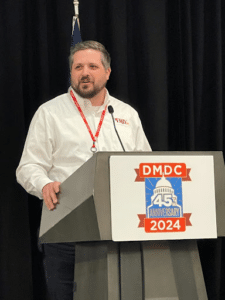Perry officials, others consider options for soon-to-be-closed Tyson plant

Kathy A. Bolten May 22, 2024 | 3:45 pm
4 min read time
990 wordsAll Latest News, Economic Development, ManufacturingThe pending closure of Tyson Fresh Meats Inc. in Perry is providing opportunities to consider other uses for the decades-old meat processing facility, city officials and others say.
“This is an opportunity to re-imagine ourselves and who we are as a community,” Sven Peterson, Perry’s city administrator said. “We’ve been brainstorming a lot on how to reuse that facility.”

Ideas that have been discussed include using the facility for cold storage for food and pharmaceutical products. Also discussed have been retrofitting the facility so that other types of manufacturers such as those who make pet foods and treats could use it.
Tyson announced in March that it planned on permanently closing the Perry plant on June 28, leaving nearly 1,300 people jobless. Tyson is Perry’s largest employer and operates the plant that has been in the community for over 60 years. Tyson officials are mum about what prompted the decision to close the plant and have not responded to several interview requests.
Iowa’s state and national officials are pressuring the Arkansas-based meat producer to quickly find a buyer for the plant. If it stays closed for an extended period, the plant risks falling into disrepair and Perry risks losing residents who had worked at Tyson.
“Our path forward right now is to try to find someone to come into that plant,” Debi Durham, director of the Iowa Economic Development Authority and Iowa Finance Authority, said at a recent board meeting. “Our entire marketing team and sales team are reaching out to our vast network of prospects and clients that we think could use the facility.”
The city of Perry, which has 8,000 residents, and a Dallas County economic development group have fielded numerous inquiries from entities interested in the plant. The inquiries have been forwarded to Tyson, they said.
Tyson is the sixth owner of the plant, which was originally developed by Perry Industries. Iowa Beef Processors acquired the plant from Oscar Meyer Corp. in 1988. Tyson acquired the plant in 2001 after it bought Iowa Beef Processors.
The plant sits on nearly 12 acres just outside Perry’s eastern border. Construction of the first phase of the plant began in 1960 and was completed in 1962. The plant originally included over 200,000 square feet of space. Since the early 1960s, several additions were added to the original building and other buildings have been constructed. The site now includes over 420,000 square feet of industrial space, according to information provided by the Dallas County assessor.
The property’s gross assessed value is $11.7 million, with nearly all of the value in the buildings, records show. In the most recent annual property tax cycle, Tyson paid $209,160 in property taxes.
If the plant sits vacant for a year or more, the property’s value could decline. How much it would decline depends on current market conditions, Kelsey Straub, chief deputy assessor for Dallas County, wrote in an email. A decline in value would also mean a drop in property taxes generated from the property.
Perry officials and others, in an effort to avoid the plant sitting unoccupied for an extended period of time, are open to other uses for the facility.
The plant has several thousand square feet of cold storage space and could be used by a distributor of food products that need refrigeration or by a pharmaceutical company that needs to keep its products cold, Peterson said. “For us, I don’t think anything is off of the table.”
Large distributors of food items like Target or Walmart could use the space to store food products, said Dirk Cavanaugh, Perry’s mayor. “The site has good truck access and it’s close to Des Moines.”
The closure of the Tyson plant provides Perry with an opportunity to rebrand itself, Cavanaugh said. Some community residents don’t relish the idea of living in a town where hundreds of animals are slaughtered daily, he said.
“There’s a lot of days when there is an odor,” Cavanaugh said. “It’s a put-off to some people. This could be an opportunity for us to bring in somebody that would be a little better corporate partner.”
Meat processing plants typically are not shuttered, said Terry Houser, an associate professor and extension meat specialist at Iowa State University. When they do close, plant owners usually want to sell quickly, but not to companies that they compete with, he said.
“It would be very surprising if Perry ever slaughtered pigs again. But they could do other animals. … The other option is the plant could be retrofitted for a different processor or manufacturer. Or it could be used for cold storage.”
The manufacturing of pet foods is a growing national market, Houser said. “We have people in that space that are in need of additional capacity.”

Rachel Wacker, executive director of the Greater Dallas County Development Alliance, said it’s possible that the plant could be retrofitted for another manufacturing use. “No matter what you’re creating or building, a manufacturing line is a manufacturing line,” Wacker said. “We anticipate that there will be opportunities for us to access different types of manufacturers that could utilize the space.”
Wacker said she’s been reaching out to national site selectors to let them know about the availability of the plant. “There are site selectors out there that specialize in specialty meat production.”
Initially, a key selling point for the plant is the availability of workers, Wacker said. A new business “has the opportunity to recruit 1,300 people who are being let go by Tyson. They would have a captive workforce of people whose skills are very transferable. There probably would be very little retraining that is necessary.”
Peterson, Perry’s city administrator, said that in discussions with Tyson, officials have indicated they want to sell the plant.
“It’s their No. 1 facility,” Peterson said. “They are saying the right things, and that is encouraging to us.”
Related article: Tyson closure reflects the tight labor market

Kathy A. Bolten
Kathy A. Bolten is a senior staff writer at Business Record. She covers real estate and development, workforce development, education, banking and finance, and housing.










